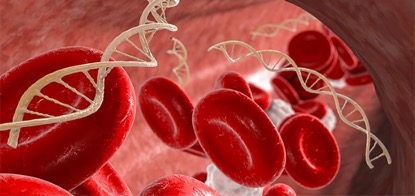Blood Tests Used to Hunt for Cancer DNA May Help Detect Cancers Faster
December 16, 2023
Source: drugdu
 384
384

For a long time, visible signs of tumor growth on scans were the benchmark for initiating cancer treatment. However, the emergence of precision oncology tools, including circulating tumor DNA sequencing, is changing this approach. These advancements allow for earlier cancer detection and adaptation of treatment strategies to combat mutations that cause resistance to current therapies. They also offer the potential for less toxic alternatives to chemotherapy.
New research led by a clinical scientist at UC Davis Health (Sacramento, CA, USA) highlights the benefits of using blood tests to search for cancer DNA. This method can speed up cancer detection and inform the use of targeted treatments. Cancer DNA circulating in a patient’s blood can be identified from a simple blood draw. This DNA is then sequenced to determine its genetic structure, helping to classify the cancer based on the findings in the blood sample. Unlike traditional tissue biopsies, which are invasive and often painful, sequencing tumor DNA from blood samples is far less discomforting for the patient. It also offers insights into mutations that could direct treatment decisions. For instance, the detection of "driver mutations" in blood samples can indicate an aggressive form of cancer well before it’s visible on other tests.
In a case involving prostate cancer monitoring, researchers discovered genetic material in a patient’s blood indicating urothelial cancer that originates in or near the urinary bladder. The patient had previously received prostate cancer treatment and was part of a study to monitor for cancer recurrence. Regular blood samples were analyzed for cancer DNA fragments to detect signs of prostate cancer reemergence. The team found that the cancer’s DNA was detectable in the blood at least 18 months before it was diagnosed using conventional methods like computed tomography (CT) scans. Upon identifying the asymptomatic urothelial cancer, the team leveraged the blood sample data to create a targeted treatment plan tailored to the specific gene mutations of the newly discovered cancer.
“It appears that by sequencing DNA circulating in the blood, we can see evidence of cancer growth months or years before it shows up in CT scans,” said Davis Professor of Medicine and the cancer center’s Chief Translational Officer Nicholas Mitsiades. “What we need now are clinical trials that will examine whether, by acting upon DNA information from a patient’s blood, we can help them live longer.”
Source:
https://www.labmedica.com/molecular-diagnostics/articles/294799587/blood-tests-used-to-hunt-for-cancer-dna-may-help-detect-cancers-faster.html
Read more on
- The first subject has been dosed in the Phase I clinical trial of Yuandong Bio’s EP-0210 monoclonal antibody injection. February 10, 2026
- Clinical trial of recombinant herpes zoster ZFA01 adjuvant vaccine (CHO cells) approved February 10, 2026
- Heyu Pharmaceuticals’ FGFR4 inhibitor ipagoglottinib has received Fast Track designation from the FDA for the treatment of advanced HCC patients with FGF19 overexpression who have been treated with ICIs and mTKIs. February 10, 2026
- Sanofi’s “Rilzabrutinib” has been recognized as a Breakthrough Therapy in the United States and an Orphan Drug in Japan, and has applied for marketing approval in China. February 10, 2026
- Domestically developed blockbuster ADC approved for new indication February 10, 2026
your submission has already been received.
OK
Subscribe
Please enter a valid Email address!
Submit
The most relevant industry news & insight will be sent to you every two weeks.



